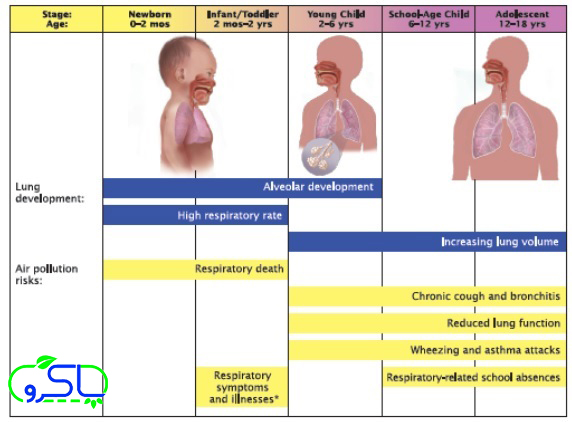Each person breathes approximately 22,000 times a day and requires approximately 15 kg of air per day. Air pollution has exacerbated cardiac and respiratory complications in patients with these diseases, and is a major contributor to the development of respiratory and heart disease in healthy people.
Certainly the respiratory system is the first part of the human body to be in direct contact with air pollution and the lung is responsible for the absorption of air oxygen and carbon dioxide excretion, hence the concentration of air pollutants higher than the lung purification capacity. Being human, they enter the bloodstream and cause complications such as impaired oxygen transfer to body tissues, myocardial infarction, increased heart rate, asthma, decreased lung capacity, bronchitis, and lung cancer.
Air pollution in the upper respiratory tract is most affected and the effects of the disease in the pulmonary patients remain acute and chronic for a long time.
The higher the amount of pollutants in the air, the more difficult the lungs will be to work and absorb more oxygen and carbon dioxide.
Air pollution can pose a serious threat to human health.
Air pollution has the most serious and serious threat to children’s health. Air pollution increases the risk of asthma in children, children are more likely to be exposed to surface air pollution due to their higher respiration rate than adults as well as their shorter height. There are various reasons for the negative effects of air pollution on children. In fact, the lungs, immune system and brain of children grow up to about 6 years of age. During this time, the cell layer inside the respiratory tract is very sensitive and permeable. In addition, children have larger lungs than their adult counterparts and draw more air into their lungs than adults. Early growth is very important for a child’s health, and children spend more time outdoors and breathe more air.

The impact of air pollution on infants
Perhaps one of the most vulnerable stages of human life is the time between fertilization and birth, during which the environment can have extremely immediate and lasting effects on health. Evidence suggests that exposure to environmental pollutants can cause preterm births (before 37 weeks gestation) or low birth weight (less than 2,500 g), or with some defects. These babies often die in infancy, and survivors are at high risk of early brain, respiratory and digestive problems. The effect of exposure to environmental pollutants on fetal development may be widespread, and delayed growth and development during embryogenesis, as the data show, is a risk for adult heart disease and diabetes.

Airborne toxins can impair lung function and brain development, or aggravate existing conditions such as asthma. Premature babies may be more vulnerable, for example, to pulmonary failure at birth.
One of the main causes of air pollution today is the exhaust emissions from diesel cars. The Adeblo system, a system for reducing diesel cars emissions, is now helping to reduce air pollution.
Read more: Some Important Adblue Tips
Pakrou has been one of the pioneers of this industry in Iran so it may help to reduce air pollutio








Leave a Reply
Want to join the discussion?Feel free to contribute!